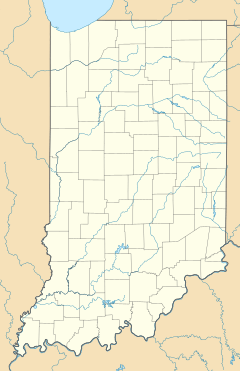Indianapolis (balance) facts for kids
Quick facts for kids
Indianapolis (balance)
|
|
|---|---|
|
Statistical entity
|
|
| Country | United States |
| State | Indiana |
| County | Marion |
| Area | |
| • Total | 368.1 sq mi (953.5 km2) |
| • Land | 361.5 sq mi (936.2 km2) |
| • Water | 6.7 sq mi (17.3 km2) |
| Population
(2020)
|
|
| • Total | 887,642 |
| • Density | 2,411.10/sq mi (930.93/km2) |
| Time zone | UTC-5 (Eastern (EST)) |
| • Summer (DST) | UTC-4 (EDT) |
Indianapolis (balance) is a special way the United States Census Bureau describes a part of the city of Indianapolis, Indiana. It includes all of Indianapolis except for a few smaller towns that are officially part of the city but are counted separately. In 2020, about 887,642 people lived in this "balance" area.
Contents
Exploring the Geography of Indianapolis (Balance)
This part of Indianapolis covers a total area of about 368.2 square miles (953.5 square kilometers). Most of this area, about 361.5 square miles (936.2 square kilometers), is land. The rest, about 6.7 square miles (17.3 square kilometers), is water. So, only a small part, less than 2%, is water.
Understanding Indianapolis's Census Areas
The government of Indianapolis and Marion County works together in a system called Unigov. This means they share a single metropolitan government. However, some towns within this area are counted separately by the Census Bureau.
Included Towns in Indianapolis
These towns are part of the larger Indianapolis-Marion County government, but they keep their own identity as separate towns under Indiana law. They are:
- Clermont
- Crows Nest
- Cumberland
- Homecroft
- Meridian Hills
- North Crows Nest
- Rocky Ripple
- Spring Hill
- Warren Park
- Williams Creek
- Wynnedale
Excluded Cities and Towns
There are also some cities and towns that are not part of the main consolidated metropolitan government. These are completely separate. They include:
The information you find about "Indianapolis" often includes the entire area with all these towns and cities. But this "balance" article focuses only on the main part of Indianapolis, without the "included towns" listed above.
People and Population in Indianapolis (Balance)
Let's look at some facts about the people living in Indianapolis (balance) from the 2000 census.
Population Numbers
In 2000, there were 781,870 people living here. These people lived in 320,107 households, and 192,704 of those were families. The population density was about 2,163 people per square mile (835 people per square kilometer). There were also 352,429 housing units available.
Diversity of Residents
The people living in the balance area came from many different backgrounds. Based on the 2000 census:
- About 69% of residents were White.
- About 25.5% were Black or African American.
- A smaller number were Native American, Asian, or Pacific Islander.
- About 2% were from other races, and 1.6% were from two or more races.
- About 3.9% of the people were Hispanic or Latino.
Households and Families
Of the households, almost 30% had children under 18 living with them. About 40.6% were married couples. Around 15.1% had a female head of household with no husband present. Many households, about 32%, were just one person living alone. The average household had 2.39 people, and the average family had 3.04 people.
Age Groups
The population was spread across different age groups:
- About 25.7% were under 18 years old.
- About 10.2% were between 18 and 24.
- The largest group, 32.9%, was between 25 and 44.
- About 20.3% were between 45 and 64.
- About 11% were 65 or older.
The average age of a person in the balance area was 34 years old.
Income Information
In 2000, the average income for a household was $40,051 per year. For families, the average income was $48,755 per year. The average income for each person in the balance area was $21,640. About 9.1% of families and 11.9% of the total population lived below the poverty line. This included 16.2% of those under 18 and 8.1% of those 65 and older.
Education in Indianapolis (Balance)
Many public school districts serve the students living in the Indianapolis (balance) area. These districts provide education from kindergarten through 12th grade (K–12).
School Districts Serving the Balance Area
Here are the nine public school districts that serve residents in this part of Indianapolis:
- Franklin Township Community School Corporation
- Indianapolis Public Schools
- Metropolitan School District of Decatur Township
- Metropolitan School District of Lawrence Township
- Metropolitan School District of Pike Township
- Metropolitan School District of Warren Township
- Metropolitan School District of Washington Township
- Metropolitan School District of Wayne Township
- Perry Township Schools
It's important to know that Beech Grove City Schools and Speedway School Town do not cover any parts of the Indianapolis (balance) area.


